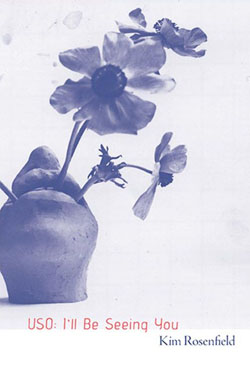USO: I’ll Be Seeing You
by Kim Rosenfield
reviewed by Rachel Trousdale
If we didn’t know better, we might think Kim Rosenfield’s USO: I’ll Be Seeing You was withholding judgment. But that’s because Rosenfield, a psychotherapist whose previous books include Good Morning-Midnight (2001), Tràma (2004), re:evolution (2009), and Lividity (2012), trusts her readers’ senses of humor and of empathy. This book-length poem, a thin column of text rarely more than two words wide, is written in the voice of a comedian who has done more than thirty tours with the USO. The monologue, sandwiched between transcripts of old comedy routines at the beginning and the lyrics of sentimental ballads at the end, is a meditation on the uses of laughter, but also an examination of the complicity of the American public in the wars in Iraq and Afghanistan and of the everyday realities of life in a war zone.
The speaker’s voice—fragmented, slightly scrambled, but clearly taken from life—moves between the lighthearted and the deadly serious as he or she (no gender is specified) describes the experience of sharing the infantry’s living conditions (“frequently / it’s / MREs / for / weeks”); considers the “logistics” involved in moving entertainers around during combat operations; and gives an impassioned defense of comedy. Comedy, we are told, is therapeutic: “it lets the / tragedy / out.” The comedian views laughter as redemptive and humanizing:
I’ve seen
the toughest
infantryman
giggle
so he had
tears
running down
his cheeks
But such moments still contain the very violence the “toughest / infantryman” needs to recover from, and the comedian describes the infantryman’s reaction in alarming terms:
he came up
after the
uncover
as good as
gave me
a bear
cuddle
which
roughly
penetrated
my rib
enclosure
Comedy may render violence more comprehensible or manageable, but it does not end it: the infantryman’s “cuddle” seems more like an assault. For all the comedian’s account of goodwill and warm welcomes, such threats of violence from within are common; there is a constant reminder that whatever the dangers of “the fight,” soldiers may also be at risk from each other and from themselves.
For most of the poem, however, the precise nature of the “tragedy” that comedy “lets out” is only hinted at. The comedian acknowledges that “we have seen / some more” of “the / unpleasantness / of war” than “we would have ever / longed for,” but much of the “unpleasantness” reported in the poem takes the form of physical inconvenience: poor food, uncomfortable cots. Real trauma is only implied, largely by the comedian’s account of what must remain unspoken:
it’s
substantially
not
appropriate
not
to ask
women
who have
been there
what
they’ve
seen
war
is
ruin
In this in this context, the comedian’s task, “to / find / the funny,’” is almost impossible, making the USO tour seem either quixotic or, more disturbingly, like a pretense of healing. The comedian’s verbal tic of repeating the phrase “as good as” becomes suspect, implying false equivalencies and superficial comparisons; for all this individual’s courage, insight, and generosity, he or she may still be part of the problem.
The poem’s violence goes in many directions. The primary conflict is with the enemy in the “fight zone,” of course, but there is also violence within the ranks, particularly, as the comedian repeatedly hints, against women. The poem’s final joke extends the dangers faced by the infantry to a broad swath of the American public. Noting the necessity of an anthrax vaccination prior to the tours, the comedian says,
now we
can
eat
unconcerned
at
any
given
Taco
Bell
for the
subsequent
twenty
years
The danger of the combat zone—weaponized anthrax—is likened to a danger in the daily life of the poor—substandard meat at a cheap fast food chain. The joke gets its sting from its simultaneous recognition of just how bad things can be at home, and just how much worse they are at war.
The comedian’s preoccupations with women, with logistics, and with what is “as good as” something else provide a cover for trauma, but like all such covers they are ineffective. The poem’s obsessive returns to and shyings away from the suffering of war suggest that, for this speaker, some things remain unspeakable. Like stand-up comedy, USO: I’ll Be Seeing You negotiates a delicate balance between mockery and sympathy, insight and a pretense of obtuseness, “giggle” and gut punch. But while Rosenfield inhabits the voice of the comedian convincingly, the poem leaves us with the feeling that war is something no laughter can redeem.
Published on July 29, 2014

